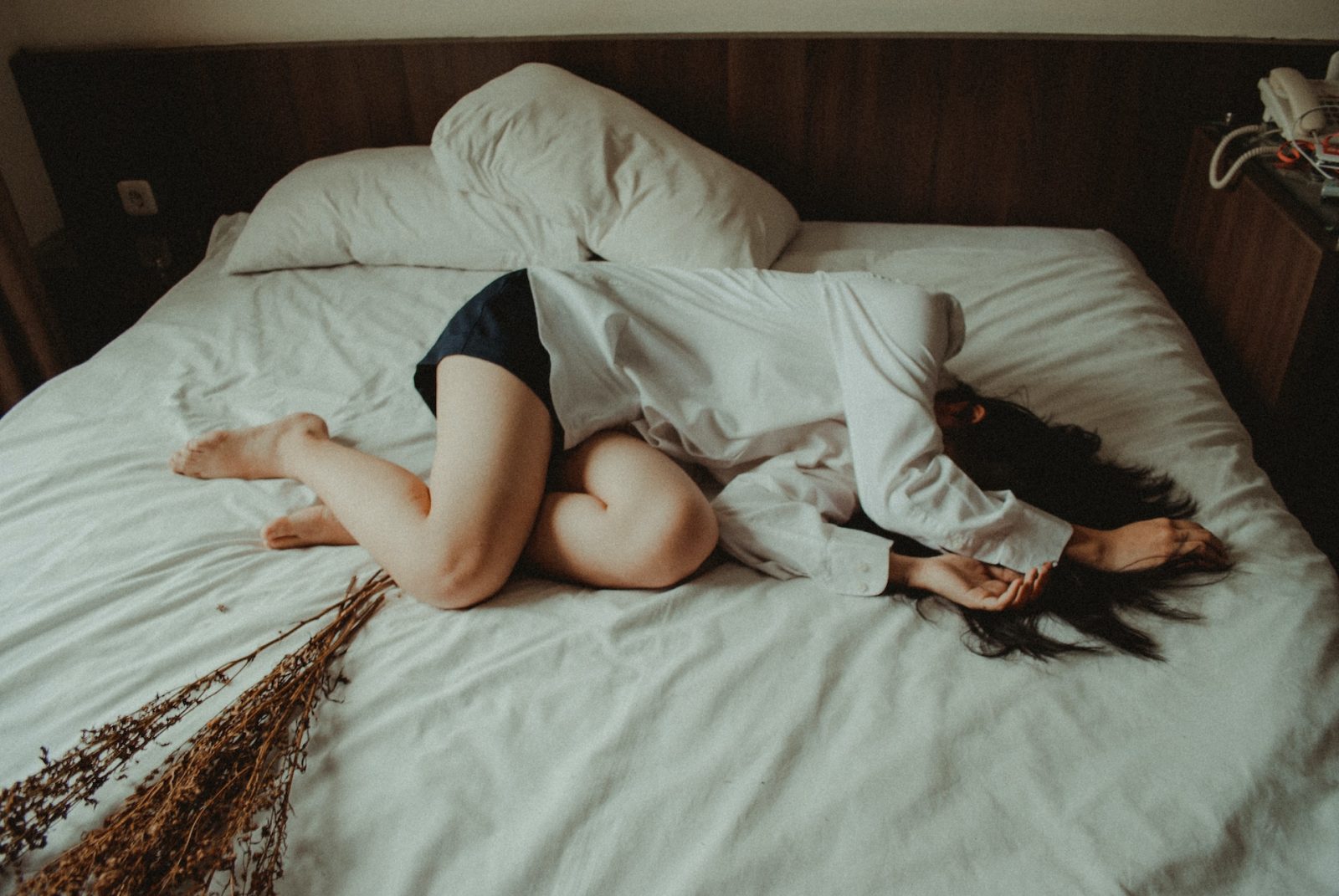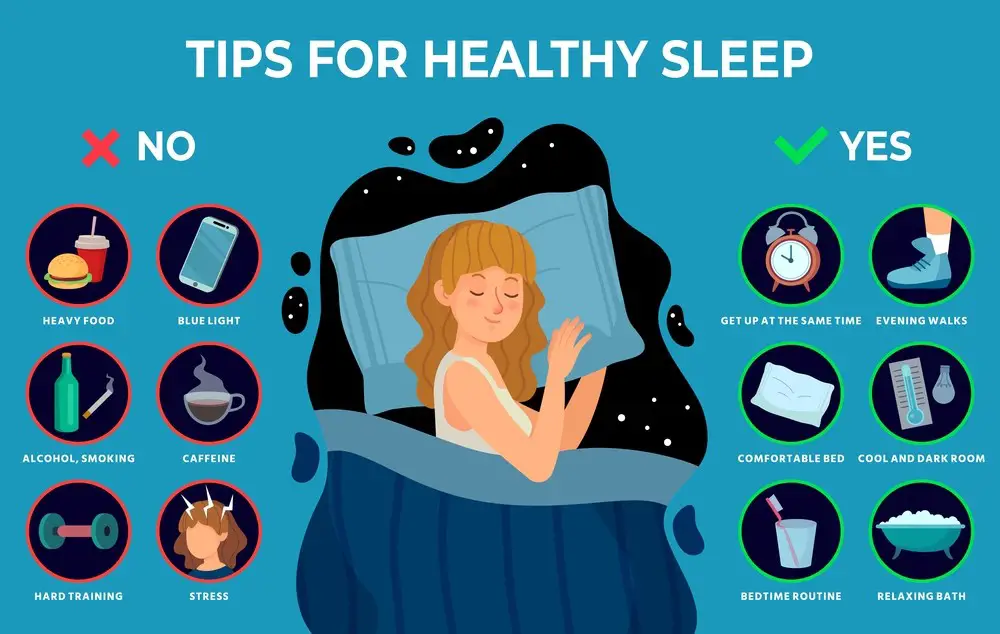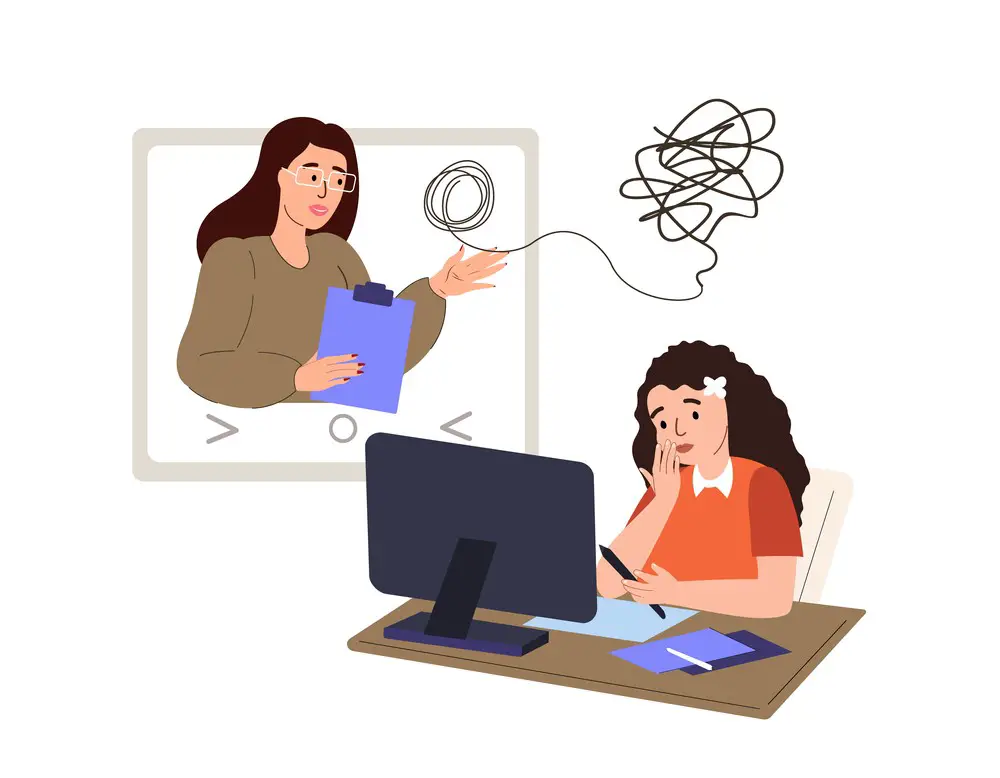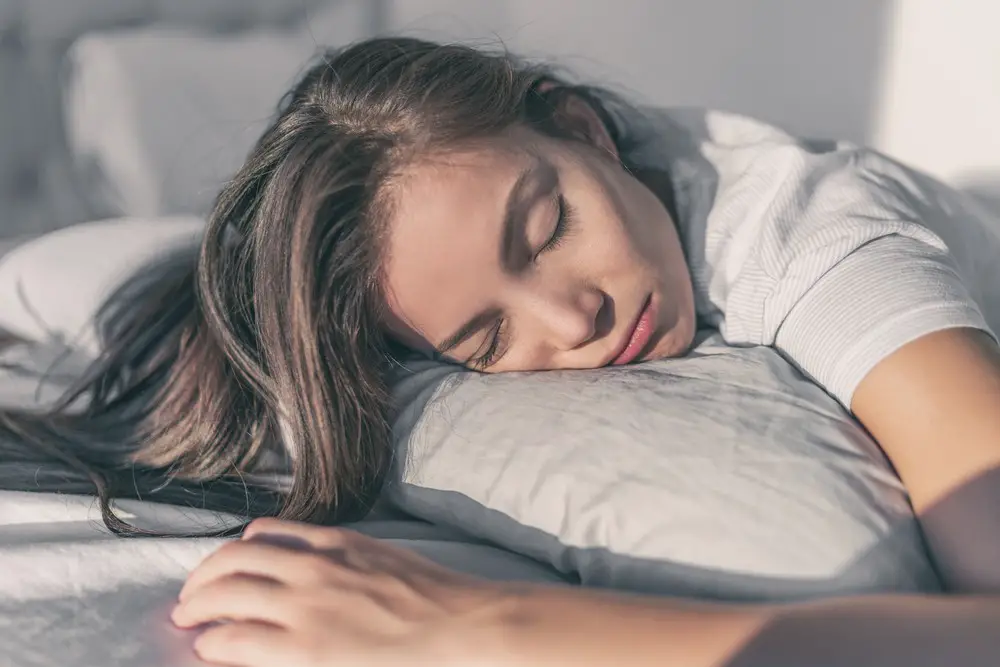As a BetterHelp affiliate, we receive compensation from BetterHelp if you purchase products or services through the links provided
Depression naps, a term many people are familiar with, refer to sleeping during the day when feeling overwhelmed, stressed, or emotionally drained. Although regular napping can be a healthy way to recharge our minds and bodies, depression naps may indicate an underlying mental health issue that needs to be addressed. These naps can sometimes temporarily relieve individuals experiencing depression, anxiety, or overwhelming stress, but they may not be a long-term solution.
The causes of depression naps can range from various lifestyle factors such as poor sleep habits, high levels of stress, or even an unhealthy relationship with technology and social media. Recognizing the signs and symptoms of depression naps is crucial for those struggling with mental well-being. By understanding the connection between sleep and mental health, individuals can make more informed decisions to seek professional help and explore treatment options.
Key Takeaways
- Depression naps can temporarily relieve but may indicate an underlying mental health issue.
- Causes can vary, including poor sleep habits, stress, and unhealthy relationships with technology.
- Recognizing symptoms and understanding the connection between sleep and mental health is important for seeking help.

Depression Nap: Definition and Causes
A depression nap refers to a nap taken by individuals experiencing depression. People suffering from depression often feel extreme fatigue and a lack of energy, which can lead to longer and more frequent naps than usual. Napping can temporarily relieve overwhelming emotions and physical exhaustion associated with depression. However, excessive napping can sometimes exacerbate the symptoms of depression and disrupt regular sleep patterns.
Depression is a mental health disorder characterized by persistent sadness, decreased interest in daily activities, and diminished functioning ability. It often affects various aspects of a person’s life, including sleep habits. Tiredness and fatigue can be common symptoms of depression, making it difficult for the individual to maintain a healthy sleep schedule.
One potential cause of depression naps is hypersomnia, a condition in which a person experiences excessive daytime sleepiness or prolonged sleep durations. Hypersomnia can be a standalone disorder or a symptom of other mental health conditions, such as depression. When an individual with depression experiences hypersomnia, they may be more prone to taking depression naps to cope with excessive daytime sleepiness.
Several factors can contribute to depression naps. Some of the causes can include:
- Biological factors: Disruptions in the sleep-wake cycle and hormonal imbalances can contribute to hypersomnia and depression naps.
- Psychological factors: Negative thought patterns and emotional stress may lead to increased fatigue and the tendency to take depression naps.
- Lifestyle factors: Poor sleep hygiene, excessive use of electronic devices, and lack of physical activity can result in fatigue and potential depression naps.
It is important to recognize that depression naps can be both a symptom and a coping mechanism for individuals with depression. While napping can sometimes provide temporary relief, over-reliance on depression naps might worsen the symptoms of depression and create unhealthy sleep patterns. Therefore, seeking professional help for depression and sleep-related issues is essential for overall well-being and recovery.
Signs and Symptoms of Depression Naps
Depression naps are daytime sleep periods triggered by sadness, low mood, or hopelessness. These naps can become a coping mechanism for some individuals experiencing a depressive episode. Identifying the signs and symptoms of depression naps can be essential for understanding this phenomenon and seeking appropriate help.
One common sign of depression naps is excessive daytime sleepiness. Individuals may feel overwhelmingly tired during the day, even if they have had sufficient sleep at night. This sleepiness can impact their daily functioning, making staying focused and engaging in activities or tasks difficult.
Another significant symptom is the urge for daytime napping. While occasional naps may be normal, those experiencing depression naps may find themselves taking naps more frequently and for extended durations. These naps may temporarily relieve sadness or hopelessness but exacerbate the issue, as excessive napping can further disrupt regular sleep patterns.
Low mood or feelings of sadness are also closely associated with depression naps. Individuals may experience a persistent sorrow or unhappiness that seems to pervade their daily life, potentially leading to the desire for sleep as a form of escape.
A loss of interest in previously enjoyed activities can be an additional indicator of depression naps. Individuals affected may withdraw from social interactions, hobbies, or work, instead opting to sleep during the day to cope with their emotional state.
Finally, feelings of hopelessness can be a core element of depression naps. People experiencing this symptom may believe their situation will unlikely improve or feel defeated by their challenges. Sleep can become a coping mechanism to avoid confronting these distressing thoughts.
In summary, depression naps are characterized by several signs and symptoms, including excessive daytime sleepiness, frequent and extended napping, low mood, a loss of interest in activities, and feelings of hopelessness. Recognizing these symptoms can help individuals better understand their experiences and seek appropriate support for addressing them.
Sleep and Depression
Sleep and depression share a complex relationship. Sleep problems, such as insomnia and sleep apnea, often coexist with depression. When sleep is disrupted, it can exacerbate the symptoms of depression and make it more challenging to manage.
Individuals with depression may experience sleep disturbances, including difficulty falling asleep, staying asleep, or sleeping too much. Insomnia, or the inability to fall or stay asleep, is the most common sleep disorder associated with depression. In some cases, the onset of insomnia can precede the development of depression.
Sleep apnea, a condition characterized by pauses in breathing or shallow breaths during sleep, can also impact those with depression. Research has demonstrated a link between sleep apnea and depression, with individuals experiencing sleep apnea more likely to develop depressive symptoms.
Proper sleep hygiene addresses sleep disorders and improves overall mental health. It involves maintaining a consistent sleep schedule, creating a comfortable sleep environment, avoiding stimulants like caffeine and nicotine before bedtime, and participating in relaxing activities before sleep. By improving sleep hygiene, individuals with depression may experience better sleep quality and reduce their symptoms.
Incorporating a healthy lifestyle can also improve the sleep experience for those with sleep issues and depression. Regular exercise, a balanced diet, and stress management techniques have all been shown to improve sleep quality and mood.
In conclusion, sleep and depression are closely intertwined, and addressing sleep issues can play a significant role in managing depressive symptoms. By focusing on good sleep hygiene and maintaining a healthy lifestyle, individuals with depression may improve their sleep quality and overall mental health.

Treatment for Depression Naps
Depression naps can be a symptom of a larger mental health issue. Addressing the underlying causes of depression naps often requires a comprehensive approach to treatment. This may include therapy, medication, or a combination of both. Individuals should consult with a mental health professional to create an effective treatment plan.
A popular therapy option for treating depression is cognitive behavioral therapy (CBT). CBT focuses on identifying and changing negative thought patterns contributing to depressive symptoms. Through regular sessions with a therapist, individuals can learn coping strategies and techniques to help them manage their emotions.
Medication can also be important in treating depression and related symptoms, such as depression naps. Antidepressants, specifically selective serotonin reuptake inhibitors (SSRIs), are commonly prescribed to improve mood and alleviate behavioral symptoms. However, individuals must work closely with their mental health professionals to find the most suitable medication.
In addition to professional treatment options, there are several self-help strategies that individuals can employ to alleviate depression naps and improve their overall mental health:
- Establish a regular sleep schedule: Going to bed and waking up simultaneously daily can help regulate the sleep-wake cycle and reduce depression naps.
- Exercise regularly: Engaging in physical activity regularly can boost mood and energy levels, making it easier to maintain a healthy sleep schedule.
- Limit exposure to screens before bed: Reducing electronic devices before bedtime can help promote a better night’s sleep.
- Practice relaxation techniques: Techniques such as mindfulness meditation and deep breathing exercises can help manage stress and reduce the likelihood of depression naps.
Individuals who experience depression naps need to recognize that they are not alone. By seeking professional support and implementing self-help strategies, individuals can find effective treatment options to address the root causes of depression naps and improve their mental health.
Coping Strategies
Living with depression can be challenging, but several coping mechanisms can help individuals manage their mental exhaustion. Regular exercise is one of the most effective ways to maintain alertness and improve performance. Engaging in physical activities can release endorphins, which are known to boost mood and alleviate depressive symptoms.
Fostering a healthy sleep routine is another essential coping strategy. Maintaining a consistent schedule, reducing screen time before bed, and creating a comfortable sleep environment can improve sleep quality. Proper rest is crucial for combating mental exhaustion and improving productivity.
In addition to exercise and sleep, individuals can practice mindfulness techniques such as meditation and deep breathing exercises. These practices can help enhance focus and promote a sense of calm, acting as valuable coping tools for navigating daily challenges.
Lastly, establishing a strong support network is crucial for living with depression. Sharing experiences and emotions with close friends, family members, or mental health, professionals can offer a sense of connectedness and help individuals feel less isolated. Communication and connection with others can serve as a vital components in managing depression and cultivating resilience.
Utilizing these various coping strategies can make a significant difference in the lives of those affected by depression. By incorporating exercise, adequate sleep, mindfulness techniques, and social support, individuals can foster a more balanced and fulfilling lifestyle, despite the challenges posed by mental exhaustion and depression.

Lifestyle and Sleep Habits
Depression naps can sometimes be attributed to an individual’s lifestyle choices and sleep habits. A healthy sleep schedule is crucial for mental well-being, and seemingly minor habits can influence the quality of rest a person receives.
One important factor to consider is bedtime. Establishing a consistent bedtime allows the body to maintain its internal clock, which helps ensure adequate rest. Going to bed at the same time every night and waking up at the same time every morning can significantly improve sleep hygiene.
Another aspect related to sleep is daytime napping. While occasional naps can restore energy, frequent or lengthy naps may disrupt nightly sleep patterns. Limiting daytime napping to around 20 to 30 minutes can prevent unintended sleep disturbances.
In addition to bedtime and napping habits, general sleep hygiene plays a significant role in an individual’s ability to get restful sleep. To improve sleep hygiene, one might consider:
- Creating a quiet, comfortable sleep environment
- Avoiding heavy meals, caffeine, and alcohol close to bedtime
- Limiting exposure to screens and electronic devices before bed
- Incorporating relaxing activities, such as reading or taking a warm bath, into the nighttime routine
It is essential to recognize the interconnectedness of these factors, as they may all contribute to the occurrence of depression naps. By addressing lifestyle and sleep habits, individuals may experience better overall sleep quality and consequently improve their mental well-being.
Impact of Technology and Social Media
The advent of technology and social media has brought about significant changes in the way people communicate, connect, and share information. This has impacted people’s mental well-being and led to new trends and habits, including depression naps.
The use of mobile devices for posting and viewing content on social media platforms such as Facebook, Instagram, and Twitter can lead to feelings of inadequacy and comparison. Seeing posts and tweets presenting a seemingly perfect life can create a sense of exclusion and intensify depression. Additionally, the prevalence of memes depicting exhaustion, burnout, and depression can normalize these feelings and encourage the behavior of taking depression naps.
It is also important to consider the impact of excessive screen time on mental health. Studies have shown that the overuse of smartphones and electronic devices can increase anxiety and depression. As individuals become more reliant on their mobile devices for communication and entertainment, they may also find it difficult to disconnect, contributing to the desire for escape through depression naps.
Moreover, constant exposure to social media notifications fosters continuous distractions, which can negatively impact sleep patterns and quality. These potential sleep disturbance factors may lead to individuals seeking respite through depression naps, thus exacerbating the problem.
In conclusion, the role of technology and social media in the rise of depression naps cannot be ignored. The constant barrage of curated content has the potential to adversely affect mental health and contribute to a cycle of negative coping mechanisms. Public awareness campaigns emphasizing the importance of a healthy relationship with technology and social media could help mitigate these emerging issues.

Seeking Help from Professionals
When facing difficulties related to depression naps, it can be beneficial to consult with health professionals. They can assist in determining whether the napping behavior is due to a more severe underlying health concern. Various specialists can be consulted, depending on the specific issues being faced.
Healthcare Providers and Sleep Experts are readily available to evaluate and provide guidance on addressing depression naps. They can offer personalized advice on improving sleep quality and identify potential triggers for depressive symptoms.
Licensed Mental Health Professionals can help individuals explore the emotional and psychological factors contributing to depression naps. This might include addressing stress, anxiety, or other emotional factors interfering with a restorative sleep routine.
Sleep Specialists can offer targeted support for individuals who are having difficulty sleeping. They can provide insights into sleep disorders contributing to depression naps and work with patients to develop an effective treatment plan.
It is important to discuss concerns about depression naps openly and honestly with a qualified professional. Health professionals can assist with gathering the necessary information to create an appropriate care plan. Sometimes, they may recommend further evaluations, tests, or consultations with other specialists to rule out or address underlying health concerns. Remember, seeking professional help is crucial in establishing a healthier and more fulfilling lifestyle, free from the burdens of depression naps.
Dealing with Depression Symptoms
Major depression is a mood disorder that can cause a wide range of symptoms, including anxiety, stress, low energy levels, and even thoughts of suicide. Dealing with these symptoms requires a combination of self-care strategies and professional help. This section will explore some key strategies for managing depression symptoms.
One crucial aspect of dealing with depression is to pay attention to one’s sleeping patterns. Poor sleep can exacerbate depression and anxiety, with nighttime insomnia often being a common issue. Establishing a routine sleep schedule and implementing relaxation techniques before bed is essential to improve sleep quality.
Creating a daily to-do list is another helpful strategy when dealing with the symptoms of major depression. A to-do list can provide structure and focus during the day, reducing feelings of stress and weightiness. Breaking tasks into smaller, more manageable parts can make getting started and maintaining motivation easier.
Maintaining a healthy diet and regular exercise can help combat depression symptoms. Physical activity has been shown to boost mood and energy levels, while a well-balanced diet can promote overall mental health. Prioritizing self-care and making positive lifestyle choices is essential to manage symptoms effectively.
For individuals experiencing depression, it’s crucial to seek help from mental health professionals, such as a therapist or psychiatrist. These individuals can provide tailored support and guidance and prescribe medication if necessary. Friends and family can also offer valuable emotional support during difficult times.
Recognizing and addressing feelings of guilt and pain is essential when managing depression symptoms. It is easy to become trapped in a cycle of negative thoughts, exacerbating symptoms. Through therapy and self-reflection, individuals can learn to cope with these emotions and develop healthier thought patterns.
In conclusion, dealing with the symptoms of depression can be challenging but is achievable through a combination of self-care strategies, professional help, and support from loved ones. By addressing sleeping patterns, creating structure, improving physical health, and seeking help when needed, individuals can gradually alleviate their depression symptoms.
The Connection between Sleep and Mental Health
Sleep plays a significant role in maintaining good mental health. It provides the body with the restorative time it requires to function optimally. When individuals experience sleep deprivation or sleep disturbances, the consequences can extend to various aspects of mental health.
A lack of sleep can lead to an increase in stress, anxiety, and mood swings. When individuals are tired, they often struggle to manage their emotions effectively, resulting in irritability and a decreased ability to cope with daily stressors. Sleep deprivation can exacerbate these symptoms, potentially leading to mental health issues like depression or anxiety disorders.
On the other hand, oversleeping can also adversely affect mental health. Consistently sleeping too much can signal an underlying issue, such as a sleep disorder or a major depressive episode. In these cases, oversleeping might be a symptom rather than a cause of the underlying condition.
Sleep disorders, like insomnia or sleep apnea, can contribute to mental health difficulties. Insomnia can lead to feelings of exhaustion and increased anxiety, while sleep apnea may contribute to poor concentration, memory problems, and mood swings. Addressing these sleep disturbances to promote better mental health outcomes is crucial.
Recognizing the connection between physical activity and mental health is also important. Regular exercise can improve sleep quality, as well as reduce symptoms of depression and anxiety. Conversely, a lack of physical activity can lead to poor sleep, exacerbating mental health issues.
Lastly, isolation plays a role in sleep and mental health. Individuals who feel isolated or lonely may struggle with their sleep schedule and overall mental well-being. Finding ways to connect with others and maintain a healthy sleep routine can contribute to improved mental health.
In conclusion, there is a strong connection between sleep and mental health. Both sleep deprivation and sleep disorders can negatively impact an individual’s emotional well-being, while physical activity, regular sleep schedules, and social connections can foster better mental health outcomes.
Frequently Asked Questions
Can depression cause excessive napping?
Depression can indeed cause excessive napping. It is common for individuals with depression to experience fatigue and a lack of motivation. Napping may be a way of coping with these feelings, providing temporary relief from the emotional and physical symptoms of depression. However, excessive napping can disrupt the normal sleep cycle and further contribute to mood fluctuations.
Are naps a form of coping for stress?
Taking short naps can be a healthy way to cope with stress for some people. A brief nap can help release built-up tension and allow the mind to reset. However, excessive napping or using naps as the primary method for dealing with stress may not be beneficial and could indicate a deeper underlying issue.
What triggers the urge to nap frequently?
The urge to nap frequently can be triggered by many factors, including physical exhaustion, high stress levels, or mental health conditions such as depression. Paying attention to daily habits, sleep hygiene, and self-care practices is essential, as these factors can also contribute to the urge to nap frequently.
How does nap anxiety relate to depression?
Nap anxiety refers to the feeling of worry and stress related to napping. It may arise when individuals fear they will not wake up on time or that napping will worsen their depression or disrupt their sleep cycle. Nap anxiety and depression can be interconnected, as individuals with depression may be prone to rumination, leading to increased anxiety and worry about napping.
Can naps worsen mental health?
Naps can have both positive and negative effects on mental health. Short naps (20-30 minutes) can benefit cognitive functioning and mood regulation. However, prolonged or excessive napping might disrupt the sleep cycle, lead to sleep inertia, or exacerbate feelings of depression or anxiety. It is important to find a balance that works for the individual and track changes in mental health.
Do depressive naps have any benefits?
Depressive naps can provide temporary relief from the symptoms of depression and offer a chance to recharge. However, it is important not to rely solely on napping as a coping mechanism or treatment for depression. Seeking professional help and incorporating other self-care practices, such as exercise and social connections, can more effectively address the underlying issues of depression.
- 7 Ideas to Help You Relax and Unwind on a Family Vacation - April 27, 2025
- How Having Cybersecurity Protection Helps You Relax - April 25, 2025
- 8 Reasons Why Spending Time Outside Calms You Down - April 25, 2025
This site contains affiliate links to products. We will receive a commission for purchases made through these links.



